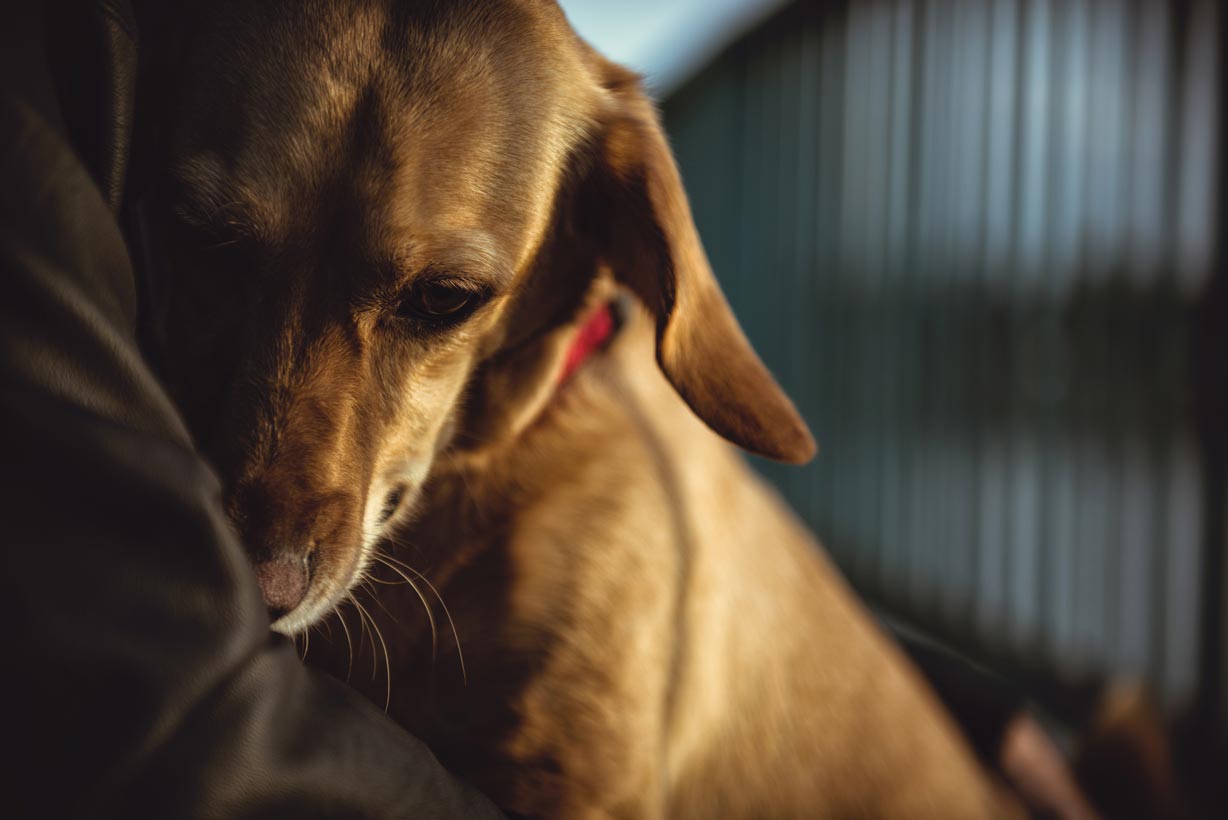How to Help a Dog with Anxiety

Fear is a normal feeling that helps dogs (and people) get out of dangerous situations. Some dogs, however, experience excessive fear of things that they perceive to be a threat but which really aren't. That's when fear turns into anxiety for those dogs, and they can develop coping behaviors that negatively affect their daily life and relationships with their human family members.
How to Recognize Anxiety in Dogs
The first step in helping a dog deal with anxiety more appropriately is being able to recognize the signs in a dog suffering from it. Some common signs of anxiety in dogs include:
- Repetitive behaviors
- Pacing
- Vocalizing
- Destructive behavior
- Yawning
- Licking at the lips
- Sudden aggression
- Cowering
You can learn more about this here: "Signs of Anxiety in Dogs."
Causes of Excessive Anxiety in Dogs
Some dogs naturally have a high-strung personality that lends itself to developing anxiety issues. Other dogs can experience conditions that trigger it, including:
- Medical conditions, especially those associated with pain or neurologic issues
- Past experiences that were traumatic, including abuse or accidents
- Lack of proper socialization as a young puppy
- Prior abuse, neglect, or extreme isolation, like being locked in a cage or left chained up the majority of the time
Canine Separation Anxiety
One type of anxiety that is quite prevalent in dogs is related to separation. These dogs become fearful and upset when their human(s) leave them alone. This can range from mild to severe, and the signs often include frantic or destructive behavior when the person is gone.
To learn more about this specific type of anxiety, check here: "Separation Anxiety in Dogs."
How to Help a Dog with Anxiety
If you suspect your dog has anxiety, the first thing to do is make an appointment with your veterinarian. Some medical conditions can have the same signs as anxiety, or they can produce anxiety and its associated signs.
Once your veterinarian has determined that your dog doesn't have a medical problem, you may be able to help your anxious dog with some or all of the following techniques:
- Behavior modification. This technique uses desensitization to help your dog learn that the thing he's been scared of is not going to harm him. This is done by slowly exposing him to the scary stimulus. For example, if your dog gets anxious around loud noises, you might start with soft noises in a different room. Give your dog treats and praise when he stays calm. Over time, you can gradually increase the stimulus by making it louder and bringing it closer. This should be done slowly and carefully.
- Visit a behaviorist. A trained canine behavior specialist can help you learn and implement techniques such as the one above for your dog. He or she will evaluate your dog's individual needs and develop a program to help him.
- Adaptil. Adaptil, previously known as DAP, is a product that mimics a pheromone that mother dogs emit to calm their puppies. It's available in a spray, collar, or diffuser, and it can help some dogs deal with anxiety. Learn more: "How to Deal with Anxiety and Fear Using Adaptil."
- Medications. Some dogs with severe anxiety might need to take medications while behavior modification techniques are being implemented. This will be up to you and your veterinarian to decide on together, weighing the risks and benefits of the different medications in your dog's individual circumstances. Never give your dog any medicine without talking to your veterinarian first because some are toxic to dogs, or your dog might react poorly to them due to a condition or the presence of other medicines in his system.
If your dog has severe separation anxiety, you might need to arrange for a pet sitter or doggie daycare situation while you are implementing behavior modification. Dogs with separation anxiety can easily destroy property and injure themselves when left alone.
You May Also Like These Articles:
How to Prevent Separation Anxiety in Your New Dog
How to Cope with Canine Anxiety and Fear by Using Adaptil(TM) (Formerly called D.A.P)
Tips for Helping Your Deaf Dog
6 Causes of Unplanned Weight Loss in Dogs
Use Your Voice and Body Language to Make Your Dog Happy
Disclaimer: This website is not intended to replace professional consultation, diagnosis, or treatment by a licensed veterinarian. If you require any veterinary related advice, contact your veterinarian promptly. Information at DogHealth.com is exclusively of a general reference nature. Do not disregard veterinary advice or delay treatment as a result of accessing information at this site. Just Answer is an external service not affiliated with DogHealth.com.


